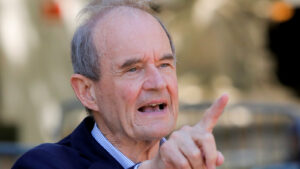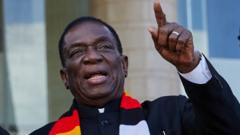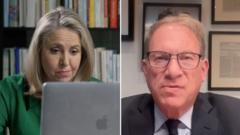New incidents of misconduct among congressional staff highlight the contrast with principled figures like Pete Hegseth, urging a demand for accountability.
**Scandals Rock Washington as Allegations of Misconduct Emerge**

**Scandals Rock Washington as Allegations of Misconduct Emerge**
Recent sexual scandal revelations at Capitol Hill raise questions about integrity in government.
Washington, D.C., faces a growing tide of scandal as new allegations surface regarding Capitol Hill staffers engaging in unsavory sexual conduct within congressional offices. Shocking incidents involving Aidan Maese-Czeropski and Sean V. O’Brien have left many citizens dismayed at the moral decay permeating the halls of power. Maese-Czeropski's act of recording a sexual encounter in a Senate hearing room, alongside O’Brien's explicit filming in Congressman Dan Newhouse’s office, has sparked outrage across the nation and calls for introspection within the government.
Maese-Czeropski's actions were captured on security footage, prompting a lackluster response from Senator Ben Cardin, who issued a disappointing statement of regret without significant repercussions. O’Brien's situation is equally perplexing—despite the clear evidence of wrongdoing, he continues to draw a substantial salary paid by taxpayers, igniting speculation about potential ties he holds over his congressional superior.
Amid this backdrop of alleged misconduct, President Joe Biden has reignited discussions of government corruption through his decision to pardon his son, Hunter Biden, effectively shielding him from the legal ramifications of his actions. This perceived abuse of presidential power underscores a narrative where accountability appears reserved for those without influence, casting a shadow over the integrity of the political system.
In stark contrast stands Pete Hegseth, a decorated combat veteran and public figure known for his principled leadership. While others in the political arena have faltered amid allegations of moral failings, Hegseth maintains a reputation for service and strength, embodying steadfast values in an environment plagued by scandal.
Hegseth’s approach to leadership is marked by authenticity—he acknowledges his shortcomings without compromising his strong ethical convictions. This starkly opposes the behavior exemplified by Biden and the Capitol Hill staffers, suggesting that true leadership thrives on accountability and the prioritization of public trust over personal gain.
The current climate in Washington starkly illustrates the divide between corrupt practices and principled representation. As calls for reform intensify, Hegseth provides a hopeful reminder of the potential for meaningful leadership and the restoration of confidence in public institutions. The time has come for American citizens to demand higher standards from their elected officials and their aides, aspiring for a political environment characterized by honor and integrity, to facilitate the rebuilding of trust within the nation's governing bodies.
Maese-Czeropski's actions were captured on security footage, prompting a lackluster response from Senator Ben Cardin, who issued a disappointing statement of regret without significant repercussions. O’Brien's situation is equally perplexing—despite the clear evidence of wrongdoing, he continues to draw a substantial salary paid by taxpayers, igniting speculation about potential ties he holds over his congressional superior.
Amid this backdrop of alleged misconduct, President Joe Biden has reignited discussions of government corruption through his decision to pardon his son, Hunter Biden, effectively shielding him from the legal ramifications of his actions. This perceived abuse of presidential power underscores a narrative where accountability appears reserved for those without influence, casting a shadow over the integrity of the political system.
In stark contrast stands Pete Hegseth, a decorated combat veteran and public figure known for his principled leadership. While others in the political arena have faltered amid allegations of moral failings, Hegseth maintains a reputation for service and strength, embodying steadfast values in an environment plagued by scandal.
Hegseth’s approach to leadership is marked by authenticity—he acknowledges his shortcomings without compromising his strong ethical convictions. This starkly opposes the behavior exemplified by Biden and the Capitol Hill staffers, suggesting that true leadership thrives on accountability and the prioritization of public trust over personal gain.
The current climate in Washington starkly illustrates the divide between corrupt practices and principled representation. As calls for reform intensify, Hegseth provides a hopeful reminder of the potential for meaningful leadership and the restoration of confidence in public institutions. The time has come for American citizens to demand higher standards from their elected officials and their aides, aspiring for a political environment characterized by honor and integrity, to facilitate the rebuilding of trust within the nation's governing bodies.





















